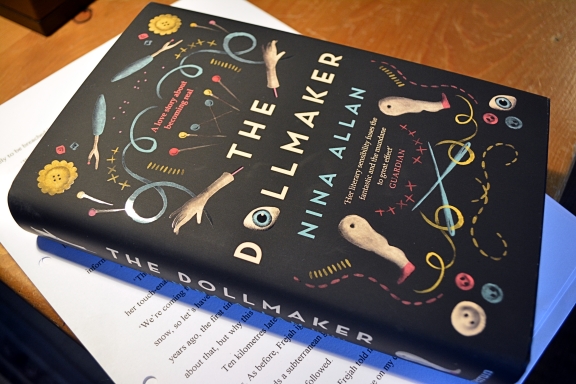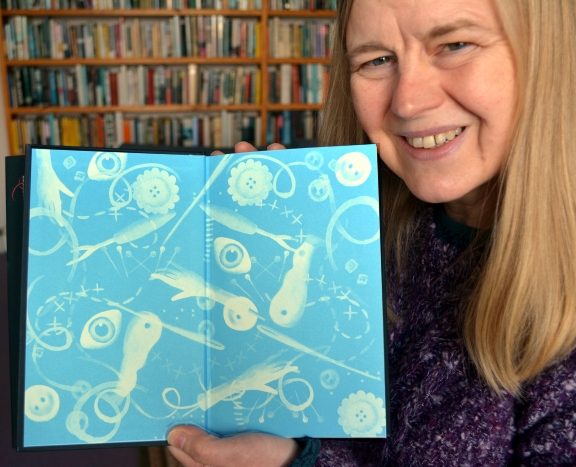Month: March 2019
The Dollmaker will be published three weeks from today and I am delighted to report that the finished book looks stunning. Check out those endpapers…


I’d already logged off by midnight last night, when the Women’s Prize longlist was announced, but I caught up with it first thing this morning with mixed reactions. I was actually very surprised to find that I’d succeeded in guessing four out of the sixteen titles – but the flavour of the longlist as a whole felt so different from my own wishlist that my overall feeling has been somewhat muted.
There are some books on the longlist that I did not get on with at all – My Sister, the Serial Killer, for example, failed for me entirely as a crime novel and felt gauche and deeply retrograde as a novel of relationships. ‘I could help Tade bleach his whites, if he would let me’ is the quote that best sums up the book’s many, many issues for me, and if I had to choose one word to describe it, it would be overhyped.
There are two books I don’t feel tempted to read because we seem to be drowning in Greek myths retellings at the moment – did the judges really have to pick The Silence of the Girls and Circe? This is just a personal bugbear and conversely I am always excited by novels that take mythology more as a starting point, resetting archetypical stories in a modern context – Home Fire by Kamila Shamsie is a prizewinning example, see also Laurence Norfolk’s masterpiece In the Shape of a Boar. Neither the Barker nor the Miller feels essential to me.
It is interesting to note that there is no dystopian fiction on this list – could this enthusiasm have run its course, at least for the moment? – and the most openly speculative novel in contention is not, as many seemed to predict, Daisy Johnson’s Everything Under but Melissa Broder’s The Pisces. I have enjoyed the vigorous debate sparked by this book, but haven’t read The Pisces yet and don’t feel in any particular hurry to do so.
This longlist does feel diverse and surprising and – its most laudable quality – it does include something for everyone. I would defy any reader not to find at least one book here that they can get wholeheartedly behind! Personally, I’m pleased and satisfied to see Milkman in contention. It could be argued that as the winner of last year’s Booker Prize, Milkman is not exactly crying out for extra publicity. However, it is an important, innovative and truly great novel – perhaps the only truly great novel on this list – and a Women’s Prize longlist that did not include it in its year of eligibility would be a nonsense. I’m delighted to see Ghost Wall, not only because it’s a superbly achieved book but also because it’s high time Sarah Moss received this kind of recognition – I hope she goes straight to the shortlist stage. I’m glad to see Sophie van Llewyn, too – her novel Bottled Goods was also longlisted for the Republic of Consciousness Prize, and both the setting and the sensibility make it an instant ‘yes’ for me. Similarly, I was reading a review of Valeria Luiselli’s Lost Children Archive just a day or two ago and felt immediately that I wanted to read it, that this book’s autofictional approach would put it right up my street.
I loved what Akwaeke Emezi said in interview about inserting pages from their journal directly into the narrative of Freshwater: “There are a couple of things about writing it this way: first, the things that people think are fictionalised are not fictionalised. Second, I wanted to make clear it was autobiography, otherwise it would be considered to be very fantastical. I wanted readers to be sure that it was not magical realism or speculative fiction. It’s what has actually happened! I’m using fiction as a filter for it”. Yes, please! Diana Evans’s Ordinary People might almost be an alternative commentary on Sally Rooney’s Conversations with Friends, its core quartet of characters moved twenty years into their futures and with a whole new set of problems. The plot summary makes it sound like yet another London mid-life-marriage-in-crisis novel, but the way it is written – free-flowing language, tumbling streams of cultural references, time shifts and jump cuts – makes it feel radical and new and very contemporary.
So that’s my kind-of preferred shortlist. I have absolutely no idea which book will go on to win. But that’s an exciting conundrum to have, and one that big prizes in literature should throw up more often.
With the longlist for the Women’s Prize announced on Monday, I thought I’d give a quick mention to some of the books I would like to see make the cut. I’m feeling excited about the Women’s Prize at the moment, mainly because both the longlist and the shortlist were so strong in 2018. I’d love to see some similarly eclectic and most of all surprising choices coming through this year.
This is not a longlist prediction. If I’m honest, I would be amazed if even one or two of these particular titles made it through. I’m deliberately going for outliers: books I think deserve more attention, books that feel resonant and exciting to me right now, books that do interesting things with language and form. I have by no means read all of these books! In some cases I’ve just sampled them, or read the author’s previous book, or have the book on my to-read list because I think it’s one I’ll respond to.
In terms of the number of books read so far, I’m doing well this year – but already I’m feeling overwhelmed by the number of books I feel I need to read but haven’t got to yet. So just to make things even more complicated, here are some more!
1. VIRTUOSO by Yelena Moskovich. 2. MILKMAN by Anna Burns 3. STUBBORN ARCHIVIST by Yara Rodrigues Fowler 4. CRUDO by Olivia Laing 5. PONTI by Sharlene Teo 6. FRESHWATER by Akwaeke Emezi 7. THE WESTERN WIND by Samantha Harvey 8. KUDOS by Rachel Cusk 9. WOMEN TALKING by Miriam Toews 10. MISSING by Alison Moore 11. ALL RIVERS RUN FREE by Natasha Carthew 12. NORMAL PEOPLE by Sally Rooney 13. MEMORIES OF THE FUTURE by Siri Hustvedt 14. MY YEAR OF REST AND RELAXATION by Ottessa Moshfegh 15. GHOST WALL by Sarah Moss 16. SEA MONSTERS by Chloe Aridjis
I would also have chosen PROBLEMS by Jade Sharma, but I don’t think it’s eligible because it’s published in Ireland. Kind of like Normal People but more out there.
I look at this list of books and feel a thrill of excitement. Wouldn’t it be wonderful to have a longlist this dynamic and this bold? There is some incredible work being done and that – especially now – is an inspiration.
I hope to be back here next week with a reaction to the actual longlist, whilst reserving the right to pass over it in silence if I am really disappointed!